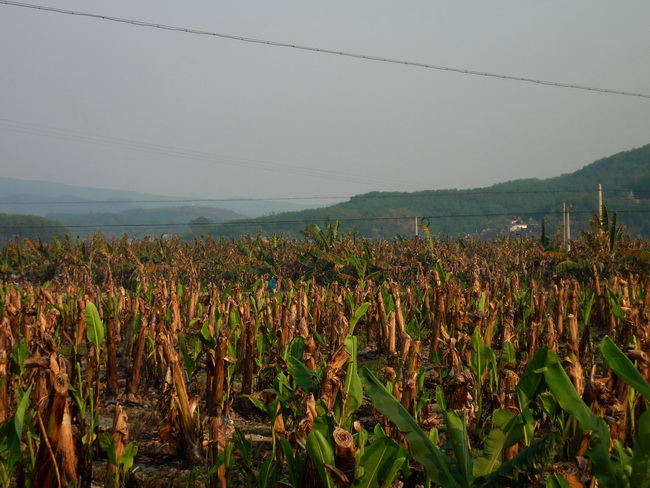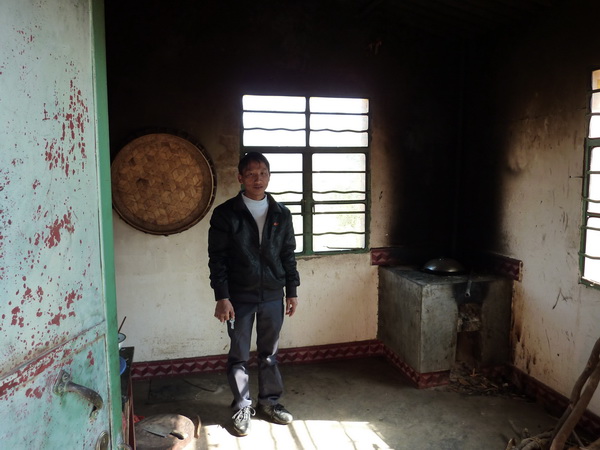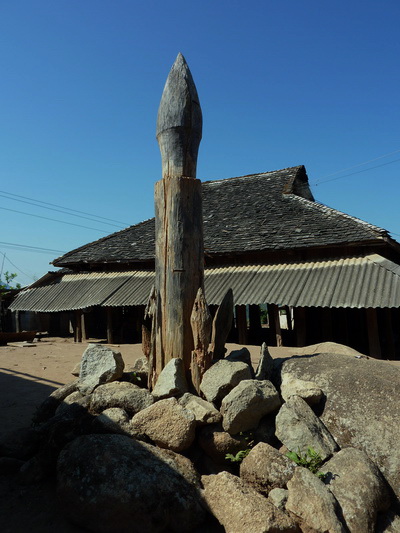Yesterday we went back to Man Guo Xin Zhai in Bulang Shan. It was a hot, dry day – 34 degrees and windy. It’s been a very dry spring with only one decent rain in months.
As we left Jinghong with our boxes of books to take to the village school, windows down and the wind blowing, a smell of wood smoke suddenly reminded me of France – the south. Our olfactory senses must surely be the most refined, our sense of smell the most evocative.
Outside Jinghong on the Menghai road it’s all bananas and rubber. After Nan Nuo Shan this scene gives way to the big tea factories and their plantations along the road side . Past Menghai. Not the ugliest of towns, but nothing much to commend it and we move into bright green fields of new rice and, in higher areas, the pale leaves of sugar cane. Farmers are out cutting the cane, a variety that is not suitable for eating but provides a cash crop that’s sold for sugar manufacture. Smoke is in the air.
We pass new Dai houses on the outskirts of Meng Hun – a sign of their growing prosperity, thanks mostly to rubber.
As we move up off the plain there are tree blossoms Bai Hua and maybe some Cherry. There are more, smaller tea plantations, but the profit from such crops is minimal; I was recently visiting some friends in Da Du Gang – an area mostly given to green tea production, Biluo Chun, where villagers started planting tea 5 or 6 years ago. But they sell the fresh leaves for 2 or 3 RMB a kg, so it’s not a ‘get rich quick’ shceme. Old tea tree farmers do rather better.
There are some new place-name signs on the side of the road in English and Chinese, translated by someone with a sense of humour. The Chinese is commonly a transliteration from a local language, so bears little or no resemblance to the original meaning: Man Da Huo, if one can wring a meaning out of it in Chinese becomes ‘Village Makes Fire’ (‘man’ is a transliteration from Dai- meaning village) which in turn becomes in English ‘Man Ignition’.
The school where we are headed is supervised by a bigger school in the village on the main road; Ah Ke Zhai which somehow gets rendered into English as ‘Acton’. It bears absolutely no resemblance to Acton (or East Acton for that matter), but it’s fun to consider the possibilites of a twinning between the two.
Going up the hill to the village, one is reminded of why people settled here. There’s water! Women are washing clothes and bathing in spring water coming out of a pipe on the roadside. None-the-less this area is recognised by the central government as an area of poverty and within that, Man Guo Xin Zhai is particularly badly affected.
When we had handed over the books and materials the teacher, Xiao Luo, he put the books on a couple of tables outside and called the children round, inviting them to have a look. The effect was noteable; as children read out loud a low hum developed. The children, despite the fact that their Chinese is less advanced than their city counterprts, were engrossed in reading. Perhaps for the first time in their village having books to read and become immersed in.


 Well, no. He’s actually the teacher in a village school in Bulang Shan. The school has one classroom, a kitchen and an office-come-bedroom.
Well, no. He’s actually the teacher in a village school in Bulang Shan. The school has one classroom, a kitchen and an office-come-bedroom.